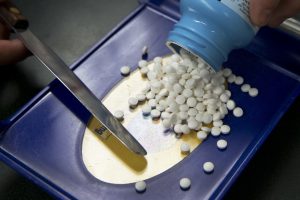This tiny cell is good news for cancer survivors
Summary
Cancer treatment, or “oncotherapy”, that involves the use of radiation and chemicals, renders patients infertile as an unwanted side effect and, while cured of cancer, they cannot beget children.
A scientist at the National Institute for Research in Reproductive Health (NIRRH) in Mumbai — an institute under the Indian Council of Medical Research (ICMR) — says a new type of stem cell identified by her team can help restore fertility in men and women who have undergone treatment for cancer.
Cancer treatment, or “oncotherapy”, that involves the use of radiation and chemicals, renders patients infertile as an unwanted side effect and, while cured of cancer, they cannot beget children.
Though women are born with a lifetime reserve of “oocytes” ( immature eggs), these are wiped out by oncotherapy. In males, the testes responsible for the production of sperms, stop making them following cancer treatment.
Currently accepted approaches for fertility preservation require male patients to deposit their sperm in “cryo-banks” before beginning cancer treatment for later use. Similarly, women, wanting to have children, must have their eggs or embryos “cryopreserved” for use after oncotherapy.
“Such approaches are invasive, expensive, technically challenging and depend on assisted reproductive technologies,” reports NIRRH cell biologist Deepa Bhartiya in the latest issue of the Indian Journal of Medical Research, the flagship journal of ICMR.
According to the report, there is now a way out. Bhartiya says research by her team over the years led to the identification of a novel population of “Very Small Embryonic-Like stem cells (VSELs)”, in testis (in males) and ovaries (in females).
Being “quiescent” by nature, these primitive stem cells (VSELs) survive cancer therapy and therefore can offer young cancer survivors options to have children without having to bank their sperms or embryos prior to oncotherapy, says the report.
“The VSELs have remained elusive over decades due to their small size and presence in very few numbers,” says Bhartiya.
The discovery of these unique VSELs (in testes and ovaries) that do not succumb to oncotherapy “opens up an alternative strategy to regenerate non-functional gonads and ovaries in cancer survivors”, says Bhartiya.
While VSELs survive cancer treatment, their original “habitat” (or niche) however gets destroyed by oncotherapy. To make the VSELs functional, their “niche” should be re-created by transplanting “mesenchymal cells” — another type of stem cells taken from the bone marrow — into the testes, says the report.
A simple and direct transplantation of “mesenchymal cells in the non-functional gonads may suffice to regenerate them,” says Bhartiya. “Similarly, transplantation of “ovarian surface epithelial cells” may allow the VSELs to regenerate nonfunctional ovaries.”
“This approach to fertility restoration is safe,” says Bhartiya pointing out to earlier studies carried out in her laboratory in mice which had shown that this method restored the role of non-functional ovaries and resulted in the birth of fertile offsprings.
“Our group also successfully restored spermatogenesis (sperm production) in non-functional mouse testis by transplanting niche (mesenchymal) cells, into the testis,” Bhartiya said.
In the light of these findings, she says the field of oncofertility may undergo a sea-change and existing strategies of cryopreservation of gametes and gonadal tissue for fertility preservation in cancer patients will have to be revised. “Pilot clinical studies (in humans) need to be undertaken.”
“VSELs may be an alternative cell source for induced Pluripotent Stem (iPS) clls,” Balu Manohar, managing director of Stempeutics Research, a Bengaluru-based stem cell company told this correspondent. “But it is still far away from the clinic as isolation and large scale expansion of these cells has to be standardised.”
-by Dr KS JAYARAMAN

Elon Musk forms several ‘X Holdings’ companies to fund potential Twitter buyout
3 Mins Read
Thursday’s filing dispelled some doubts, though Musk still has work to do. He and his advisers will spend the coming days vetting potential investors for the equity portion of his offer, according to people familiar with the matter









 Listen to the Article
Listen to the Article  Daily Newsletter
Daily Newsletter





